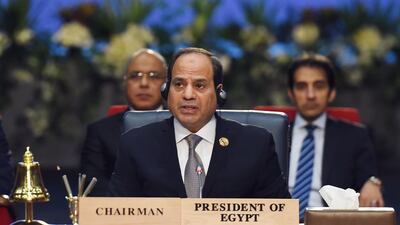The landmark Arab-European summit held in the Egyptian resort of Sharm El Sheikh this week was supposed to formulate a joint vision for tackling the twin challenges of terrorism and migration.
Instead, it turned into an unseemly row over human rights, once again highlighting the deep chasm of misunderstanding that continues to undermine efforts by Arab and European leaders to make common cause in tackling two of the most difficult issues of the 21st century.
The convening of the two-day summit at the Red Sea resort represented a significant diplomatic triumph for Egypt’s beleaguered President Abdel Fattah El Sisi, who managed to persuade leaders from all the major Arab and EU states to attend the conference with the aim of formulating a joint strategy for tackling terrorism and developing a framework for allowing “organised and safe” migration to Europe.
Both issues are of paramount importance to these two influential constituencies, and should form the basis for a new era of mutual co-operation.
In the event, the conference ended on a sour note after Mr El Sisi felt obliged to deliver a withering attack on his European critics, who appear more concerned with criticising the Egyptian leader over human rights than seeking an effective partnership to deal with the migration and terrorism issues.
After facing criticism over his decision to authorise the execution of nine terrorists convicted of murdering Hisham Barakat, Egypt’s chief prosecutor, in 2015, Mr El Sisi delivered a blistering riposte.
“You are not going to teach us about humanity,” the Egyptian president declared. Europeans and Arabs have a different “sense of humanity, values and ethics,” he said. “Respect our values and ethics, as we do yours.”
Thus, rather than helping to forge a common approach between Arab and European leaders, the conference succeeded in highlighting the serious divisions that remain between the two sides, leaving the serious business unresolved of their future plans for tackling the very serious challenges that lay ahead.
The modern curse of Islamist-inspired terrorism, after all, remains as much a threat to the stability of the Arab world as it does the well-being of the Europeans, with the final death throes of the so-called ISIS caliphate in Syria providing a timely reminder as to the enduring nature of the anti-Islamist campaign.
The end of the so-called caliphate might mean that ISIS is no longer be able to terrorise large areas of northern Iraq and Syria, as it did for several years after its formation in 2014.
But there is a widespread expectation that ISIS will now try to concentrate its efforts on conducting high-profile terror attacks against targets in both Arab and EU states, which is why there is mounting concern about the fate of the thousands of ISIS fighters – many of them European citizens – who are currently being held in northern Syria by Western-backed Kurdish forces.
The Kurds admit they have been overwhelmed by the sheer volume of ISIS fighters and their dependents who have been captured or surrendered during the final push by the Syrian Democratic Forces against the last ISIS enclave of Baghouz on the Iraqi-Syrian border.
And yet the Europeans, who committed themselves to destroying the caliphate, appear strangely reluctant to accept any responsibility for dealing with the hundreds of foreign fighters holding European passports who now find themselves languishing in Kurdish holding camps.
And so long as the Europeans are reluctant to accept responsibility for resolving this issue, the more likely it is that many of these fighters will simply slip away and form new terror cells, an outcome that could have serious consequences for Arabs and Europeans alike.
The migrant crisis is another issue where the EU desperately needs to establish a good working relationship with its Arab partners, if it is to avoid further political turmoil as European member states continue to struggle with the hundreds of thousands of people fleeing conflicts in the Arab world and elsewhere.
Over the past three years, the migrant crisis has severely damaged the political standing of German chancellor Angela Merkel, and more recently has resulted in an unseemly diplomatic row between France and Italy, which resulted in the French ordering the withdrawal of their ambassador from Rome. It may even have been a contributing factor in Britain’s decision to leave the EU.
Moreover, European leaders should not forget that the reason one of the major Mediterranean migrant routes between North Africa and southern Europe is able to function is because of the current lawlessness affecting Libya as a result of the decision by leading European powers, such as Britain and France, to overthrow the Qaddafi regime in 2011.
Indeed, before lecturing Arab leaders like Mr El Sisi over their human rights record, EU leaders would be better advised to reflect on their own disastrous contributions to the instability currently affecting many North African states, from their backing of the Muslim Brotherhood government that is responsible for many of Egypt’s current woes, to presiding over the collapse of Libya as a functioning state.
For it is the Europeans, not the Arabs, who must shoulder the lion's share of the blame for helping to create the migrant crisis in the first place, as well as creating the conditions in countries such as Iraq, where Islamist terror cells have been allowed to flourish with impunity.
So it is very much in their interests that, rather than patronising Arab leaders such as Mr El Sisi, who are committed to tackling Islamist extremism, as well as curbing the flow of migrants to Europe, EU leaders concentrate their energies on establishing a constructive working relationship with their Arab allies.
Con Coughlin is the Daily Telegraph’s Defence and Foreign Affairs Editor

